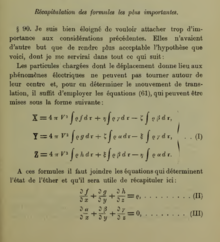
Back Hendrik Antoon Lorentz ALS Hendrik Antoon Lorentz AN هندريك أنتون لورنتس Arabic هندريك انتون لورنتس ARZ Hendrik Antoon Lorentz AST Hendrik Lorentz Aymara Hendrik Lorens Azerbaijani هندریک لورنتز AZB Hendrik Lorentz BAN Хендрык Антон Лорэнц Byelorussian
Hendrik Lorentz | |
|---|---|
 Lorentz in 1902 | |
| Born | Hendrik Antoon Lorentz 18 July 1853 Arnhem, Netherlands |
| Died | 4 February 1928 (aged 74) Haarlem, Netherlands |
| Alma mater | University of Leiden |
| Known for |
|
| Awards |
|
| Scientific career | |
| Fields | Physics |
| Institutions | University of Leiden |
| Doctoral advisor | Pieter Rijke |
| Doctoral students | |




Hendrik Antoon Lorentz (/ˈlɒrənts/; 18 July 1853 – 4 February 1928) was a Dutch physicist who shared the 1902 Nobel Prize in Physics with Pieter Zeeman for the discovery and theoretical explanation of the Zeeman effect. He derived the Lorentz transformation of the special theory of relativity, as well as the Lorentz force, which describes the combined electric and magnetic forces acting on a charged particle in an electromagnetic field. Lorentz was also responsible for the Lorentz oscillator model, a classical model used to describe the anomalous dispersion observed in dielectric materials when the driving frequency of the electric field was near the resonant frequency, resulting in abnormal refractive indices.
According to the biography published by the Nobel Foundation, "It may well be said that Lorentz was regarded by all theoretical physicists as the world's leading spirit, who completed what was left unfinished by his predecessors and prepared the ground for the fruitful reception of the new ideas based on the quantum theory."[2] He received many other honours and distinctions, including a term as chairman of the International Committee on Intellectual Cooperation,[3] the forerunner of UNESCO, between 1925 and 1928.
- ^ Cite error: The named reference
frswas invoked but never defined (see the help page). - ^ Hendrik A. Lorentz – Biographical, Nobelprize.org (retrieved: 4 November 2015)
- ^ Grandjean, Martin (2018). Les réseaux de la coopération intellectuelle. La Société des Nations comme actrice des échanges scientifiques et culturels dans l'entre-deux-guerres [The Networks of Intellectual Cooperation. The League of Nations as an Actor of the Scientific and Cultural Exchanges in the Inter-War Period] (phdthesis) (in French). Lausanne: Université de Lausanne.
© MMXXIII Rich X Search. We shall prevail. All rights reserved. Rich X Search